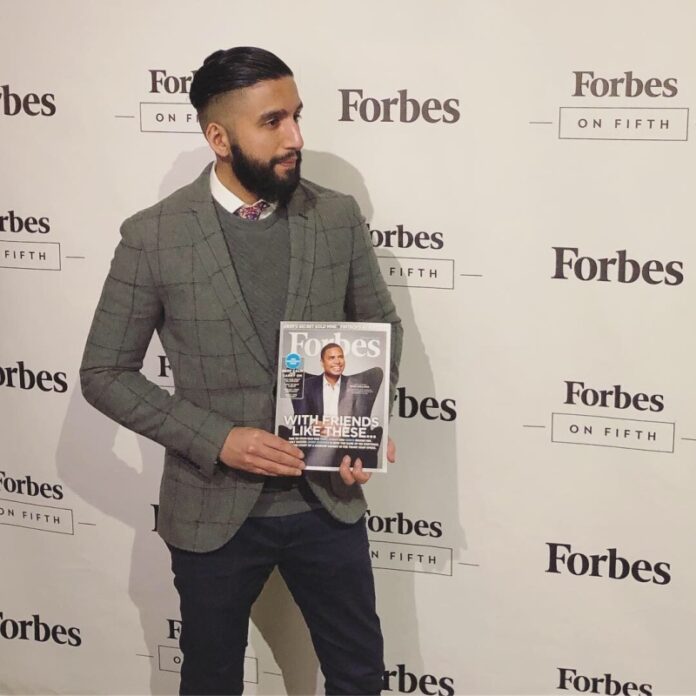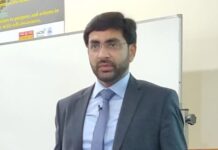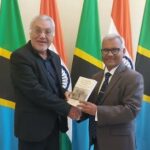A Khoja high-flyer who was promoted from intern to vice-president in just three years has been honoured in the coveted Forbes 30 Under 30 list for Finance. This was due to extraordinary career achievement and community inspiration.
Even more impressively, Ali-Reza Panjwani’s meteoric career progression came at international investment bank JP Morgan Chase & Co.
Relocating to New York in 2016, Panjwani now works in the Asset & Wealth Management division at JP Morgan’s headquarters.
Inspiring young Khojas
Panjwani, who was brought up in Chelmsford, Essex, says: “The global Khoja community (its platforms, events, people and leaders) have laid a strong foundation for me and my family over the years, and I hope that my story will inspire other young Muslims, and in particular our young Khojas.”
He explains: “I am deeply fortunate to be recognised in the illustrious Forbes 30 Under 30 list, and grateful to share it with other young bright talent from all over Europe. This is certainly my biggest achievement to date, but what’s more important is how I use this platform to inspire others. It would be remiss of me not to help others as this award signifies possibility and opportunity. It should give hope to the underdogs and the outliers to remain resilient, maintain your character and be limitless in your ambition.
“The journey here had its ups and downs but ultimately, through the grace of God and the unconditional support of my family, I was able to adapt and navigate my way through. After a number of obstacles, missed opportunities and rejected applications, I never shied away. I just kept showing up, day after day. This determination and ability to adapt to different conditions was developed early on. I came from an immigrant family, I was constantly in the minority whether in school or at my local sports club, I was more often than not the only Muslim in my class so I felt different social pressures and I had to dig deep during my youth and early adulthood, in order to be heard.”
The summer everything changed
After graduating in Business and Management from Aston University, Birmingham, in 2011 Panjwani worked for two years as a HR business partner at Pinsent Masons LLP before making his dream move into financial services through an internship with JP Morgan in the summer of 2014.
He says: “This is when everything changed; I picked up the bank’s prestigious Bob Johnson Memorial Award for the best analyst (amidst a highly competitive class) and was invited to be a key speaker at the Turkish Consulate (New York) at their Young Leader’s forum.
“After completing my internship in 2014, I was hired as an Associate at JPMC’s London office, before being offered a sponsored relocation to New York in 2016, to support an important initiative under the Chief Operating Office. I was promoted to Vice President in 2017, with my platform steadily increasing, enabling me to experience different areas of the bank; which included Credit Risk, Finance & Business Management and Operational Risk. This quick ascent meant that I had gone from an intern (2014) to a Vice President (2017) in less than three years – I am indebted to the various managers, mentors and colleagues I have worked with during the last few years”
Giving back to help others
Determined to give back and help other young people find success, Panjwani has spoken at career panels all around the world, shared his advice through alumni programmes and was appointed as an Aston University Career Champion.
“I sincerely hope that my story helps to highlight that a small town kid who’s first job was picking apples at a farm shop in Essex, can eventually find his way to the ‘Big Apple’, to work for the largest investment bank in the world,” he says.
Community service
Panjwani’s parents Sibtain and Nasim both immigrated to the UK in the late 60s and early 70s and this had a huge impact on his work ethic, ambition and attitude in life. “My resilience and sheer willingness to succeed is from my mother; she is the most hard-working person I know and the absolute bedrock of our family. My ambition comes from my father, the head of our family; he has always taught me to dream big, and then to take that dream and dream even bigger! But to never lose your identity or compromise on your moral compass.
“Their service to the community also wasn’t lost on me – I felt obliged to give back, to inspire, to mentor, or simply help in any way possible. My family have a rich history in serving the wider community, and we are here standing tall, only because of the broad shoulders of our forefathers; their selfless service from generation to generation, continues to drive me to give back and make a difference (no matter how small).
Leaving a legacy
“My religion has also played an integral part in my journey – the unique opportunity that we have to be able to call on God, to trust in His plan, to believe in His will and learn from His disciples – this gives me solace that whatever happens over the next five or 50 years, the true sustenance will come from Him. A hadith that my brother shared with me always resonates closely: “The passage of time has two days – a day for you and a day against you. When it is for you, don’t be proud. When it is against you, be patient!”(Imam Ali – Nahj al Balagha)
“The parting message to those reading this is to remember to leave a legacy; make your mark in whatever you do. Life is fleeting, it’s fragile, so leave a lasting impression on the people that you encounter. Take time out to learn from each other, build sincere relationships and listen attentively to those you look up to, as you’ll be surprised how much knowledge you can obtain by simply observing and listening. Everyone wants instant results; it’s the society we live in nowadays, but trust me, good things will take time to build; so be patient in your endeavours. ”
Advice to young professionals
Panjwani’s advice to those embarking on a financial career is as follows:
“The financial industry is ruthless but it’s filled with opportunity – you must keep up with the trends and the changes. Look for geo-political patterns, economic growth areas and most importantly technological advancements, as financial firms are now operating radically differently to how they were 20 years ago, or even 10 years ago. With these changes, make sure your skillset is constantly growing – the workforce is getting better, more efficient and ultimately more competitive, so you need to constantly improve and refine your portfolio. Learn multiple languages, stretch yourself beyond what you’re good at, focus on your weaknesses and throw yourself into the unknown. Remember, you are the author of your own story; so go out and seek as much knowledge as you can. This will help position you amongst the very best in your respective field”.
See his Forbes profile here













